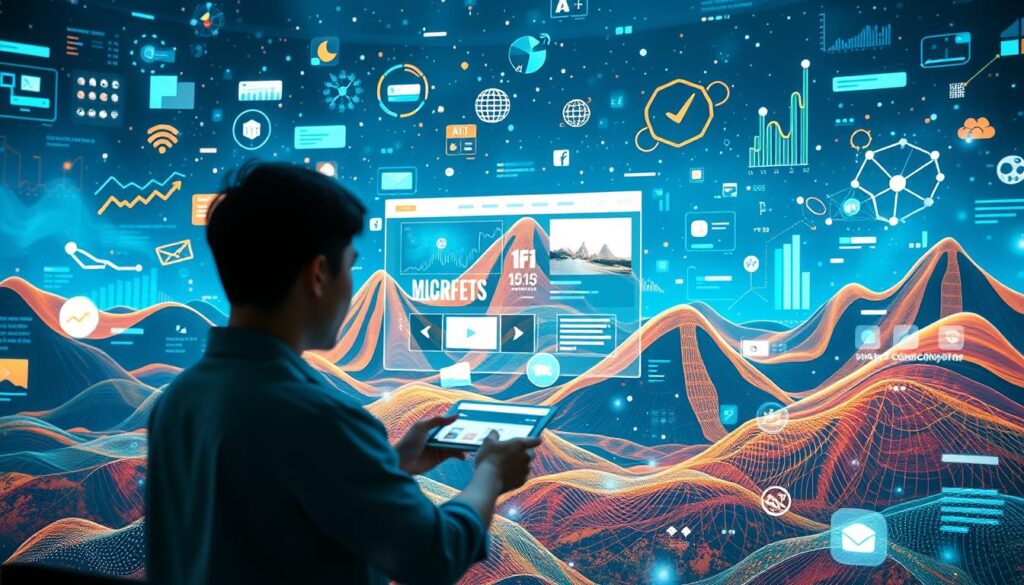Ever felt like some brands know you better than your friends? AI content personalization is making a big change in digital marketing. It creates experiences that really speak to people.
This shift meets today’s audience’s desire for unique interactions. It also increases engagement and satisfaction. Businesses are turning to digital marketing AI to improve their strategies. The move from generic to personalized content is key to success.
In this article, we’ll see how AI is changing content marketing. We’ll also look at its big impact on brand-consumer relationships.
Key Takeaways
- AI is transforming how brands engage with consumers through personalized content.
- Tailored marketing strategies enhance customer satisfaction and loyalty.
- The integration of AI tools is crucial for effective digital marketing efforts.
- Personalized content creation is becoming essential in today’s competitive landscape.
- Understanding audience behavior is key to successful AI-driven strategies.
Understanding the Importance of Content Personalization
In today’s digital world, personalized marketing is key. Old, generic ads often fall short because people know what they want. With AI and data, marketers can make ads that speak directly to each person.
The Shift from Generic to Personalized Marketing
Marketing has changed from broad to personal. Now, using customer data, ads can be made just for you. This makes brands connect better with people, as content matches what they like and do.
Impact on Customer Engagement and Satisfaction
Personalized marketing boosts customer interaction and happiness. It shows brands care about what you need. People are more likely to stick with brands that get them.
When ads feel made just for you, you’re happier. This leads to more business and lasting relationships.
The Role of AI in Revolutionizing Marketing Strategies
The marketing world has changed a lot. It moved from old ways to new, AI-based strategies. Now, companies use tech to connect better with their audience. This change shows how big of an impact AI has on marketing.
Evolution of Traditional Marketing Approaches
Old marketing used broad strategies like print ads and TV commercials. It relied on general info about people. But now, AI lets companies understand what their audience really wants.
This change is huge. Brands can now make messages that speak directly to each person.
The Benefits of Integrating AI in Digital Marketing
Using AI in marketing has many benefits. It helps companies understand their audience better. This means they can use their resources more wisely.
AI also lets brands make decisions fast. This helps them connect with people in a more meaningful way.

AI Content Personalization: Technologies Behind the Magic
AI content personalization comes from combining advanced technologies. Machine learning and natural language processing are key. They change how businesses talk to customers. This makes interactions more relevant and builds stronger connections.
Machine Learning and Behavioral Analysis
Machine learning is vital in AI. It helps systems understand and analyze huge amounts of data. This way, it creates content that meets individual needs.
Businesses can improve their marketing by using machine learning. It helps them see what their customers like.
Natural Language Processing for Enhanced User Interaction
Natural language processing (NLP) is crucial for brand-consumer communication. It makes interactions natural and enjoyable. This ensures messages match what users like.
Companies using NLP see better customer satisfaction. They have more meaningful conversations with their audience.
How AI Optimizes Content Marketing Efforts
In the world of digital marketing, using content marketing AI is a big plus. It helps businesses make their marketing better with smart content and personal touches. These tools make users more engaged and help sell more.
Dynamic Content Adaptation
Dynamic content adaptation makes websites change based on what users like. AI looks at how users act and changes things like layout and pictures. For example, if someone likes outdoor gear, they might see different stuff on the site next time.
This makes users feel like the site gets them, which is good for business.
Personalized Recommendations and Product Suggestions
AI also makes personalized suggestions for products. It looks at what users like and buy, then shows them things that fit. For online stores, this means showing items that go well with what they’ve bought before.
This makes shopping better and more likely to lead to sales. Customers feel like they’re getting something special, which makes them happy.

Real-World Examples of AI in Digital Marketing AI
In today’s fast-paced world, AI has changed how businesses reach out to customers. Companies like Shopee and Lazada use AI to make shopping more personal. They use advanced algorithms to offer experiences that fit each customer’s needs.
Case Studies from Leading Brands
Studies show how AI helps businesses connect with customers on a deeper level. For example, Netflix uses AI to guess what shows you might like. This approach has made viewers more engaged and loyal.
AI-Driven Personalization in E-commerce Platforms
Shopee and Lazada also use AI to understand what you like to buy. They suggest products that match your interests. This not only makes shopping better but also boosts sales. They use data to create ads that really speak to you, even on social media.
AI’s role in digital marketing is huge. It helps top brands keep customers coming back. These stories show how AI is changing the game, making shopping more personal and fun.
| Brand | AI Application | Results |
|---|---|---|
| Netflix | Personalized content recommendations | Higher viewer retention rates |
| Shopee | Tailored shopping experiences | Increased sales growth |
| Lazada | Personalized product suggestions | Enhanced customer satisfaction |
AI-Powered Chatbots: Transforming Customer Engagement
AI-powered chatbots are changing how businesses talk to customers. They offer personalized help any time of day. This is key in making customer support better, as chatbots can answer questions right away.
These chatbots use smart algorithms to understand what customers want. They use this info to make interactions better, which helps keep customers happy and loyal.
24/7 Personalized Customer Support
AI chatbots make sure customer support is always there. This makes the experience smooth for users. They can answer common questions, help with processes, and suggest products based on what customers have bought before.
This helps businesses improve their strategies. It turns questions into sales and builds strong relationships with customers.
Automation of Repetitive Tasks for Enhanced Efficiency
AI chatbots are great at doing tasks that take up a lot of human time. They can book appointments or handle returns, freeing up staff for more important work. This makes things run better and gives customers a better experience.
Customers get help faster and get service that’s just for them. This makes them happier and more likely to come back.
| Feature | AI-Powered Chatbots | Traditional Customer Support |
|---|---|---|
| Availability | 24/7 support | Limited hours |
| Response Time | Immediate | Varies |
| Support Task Automation | High | Low |
| Personalization | High | Moderate |

Digital Marketing AI Tools for Personalization
Many AI tools are now key for businesses wanting to boost their marketing. They help analyze campaigns and create personalized strategies. These tools make marketing more effective by connecting with people in a meaningful way.
Best Tools for AI-Powered Campaign Analysis
Some top AI tools are great for analyzing campaigns. HubSpot, Mailchimp, and Salesforce Einstein are leaders in this field. They give marketers deep insights into how campaigns perform and what customers do.
- HubSpot: It has strong analytics to track campaign success. Marketers can adjust their plans based on current data.
- Mailchimp: It’s famous for email marketing but also offers AI insights. These help target the right audience and personalize content.
- Salesforce Einstein: This AI system improves customer management. It uses past data to predict future trends and behaviors.
Integrating AI Tools into Existing Marketing Frameworks
Adding AI tools to current marketing plans can make things smoother. Businesses in the Philippines can run complex campaigns easily. Key steps include:
- Data Synchronization: Making sure all systems talk to each other for a complete view of customer interactions.
- Customization and Personalization: Using AI insights to give content and suggestions that match each customer’s profile.
- Performance Tracking: Keeping an eye on campaigns to make changes as needed.
| AI Tool | Main Feature | Benefits |
|---|---|---|
| HubSpot | Marketing Analytics | Improved campaign targeting and monitoring. |
| Mailchimp | Email Automation | Enhanced engagement through personalized content. |
| Salesforce Einstein | Predictive Analytics | Forecasting customer behaviors for tailored experiences. |
Challenges and Considerations in AI Content Personalization
AI in content personalization is growing fast, but big challenges come with it. Data privacy is a big worry in digital marketing. Laws like GDPR and CCPA make companies work hard to keep user data safe while still marketing well.
It’s key to follow these rules to keep customers trusting you.
Data Privacy Concerns and Regulations
Data privacy laws change how companies handle user info. Breaking these laws can hurt your reputation and cost money. It’s tough to use AI right while keeping data safe.
The main goal is to get user consent and be clear about data use. Brands need strong policies to protect customer data. This shows how important data privacy is in today’s world.
Over-Reliance on AI: Balancing Human Touch and Technology
Finding the right AI balance is hard. Too much AI can make interactions feel fake and boring. Customers want real, personal connections.
Brands need to mix AI with human touch. This way, AI helps with efficiency, but empathy and understanding stay important.

AI Content Personalization Strategies for Businesses
Using AI for content personalization needs a deep understanding of each business’s unique needs and resources. Companies can find scalable solutions that fit their goals and budgets. These strategies make marketing more effective and build stronger customer relationships.
Scalable Approaches for Different Business Sizes
Different businesses face different challenges in digital marketing. Small businesses can use low-cost AI tools that fit their size. These solutions help them manage their marketing efforts well without using too many resources.
Medium and large businesses might need more advanced AI tools. These tools use detailed analytics to understand customer behavior better. This helps them create more targeted marketing campaigns.
Personalization Techniques for Better Targeting
Using the right targeting techniques can really boost engagement. Businesses should use AI to segment their audience and analyze their behavior. This way, they can send messages that really speak to their customers.
By personalizing their strategies, brands can connect with customers on a deeper level. This connection leads to more sales and builds loyalty. In the end, it helps businesses grow in a sustainable way.
Conclusion
AI content personalization is changing digital marketing. It uses advanced algorithms to create experiences that connect with people. This approach boosts customer loyalty, which is key in today’s market.
Brands that use AI can meet today’s consumer needs better. The future of AI in marketing looks promising. It will help make real connections and improve customer happiness.
Brands that adopt AI content personalization are on the right path. As people want more personalized experiences, those using AI will stand out. They will not only engage more but also build strong relationships with their audience. For more on the ethics of AI in marketing, see this resource on ethical AI marketing practices.
FAQ
What is AI content personalization in digital marketing?
AI content personalization uses AI to make marketing messages fit each customer’s needs. It looks at what they like and how they act. This makes content that really speaks to them, making customers happier and more engaged.
How does AI improve customer engagement?
AI helps brands move from general to personal marketing. It uses data to send messages that are just right for each person. This makes the experience better and builds stronger bonds between brands and customers.
What technologies are used in AI content personalization?
Machine learning and natural language processing are key. They help understand what users want and need. This lets brands offer more personalized and engaging interactions.
Why is personalization important in today’s marketing landscape?
Today’s shoppers want unique experiences. Generic ads just don’t cut it. Using AI for personalized content boosts engagement and satisfaction, which is good for business.
What are some real-world examples of AI in digital marketing?
Amazon and Netflix use AI to suggest products based on what you’ve bought before. Shopee and Lazada use AI to make shopping better, leading to more sales and loyal customers.
How do AI-powered chatbots enhance customer interactions?
Chatbots offer 24/7 support and suggest products based on your past choices. This makes customers happier and frees up human staff for more important tasks, like seen at Zomato.
What tools can help businesses implement AI content personalization?
Tools like HubSpot, Mailchimp, and Salesforce Einstein help analyze and personalize marketing. They offer advanced analytics and strategies, making it easier to engage customers without losing efficiency.
What are the challenges associated with AI content personalization?
Big challenges include keeping user data safe due to laws like GDPR and CCPA. Also, relying too much on AI can make customer interactions feel less human. It’s key to find a balance.
How can small businesses leverage AI for personalization?
Small businesses can use affordable AI tools to improve their marketing. By segmenting their audience and using AI insights, they can make sure their messages hit the mark. This boosts engagement and sales.

